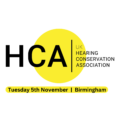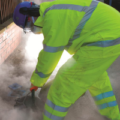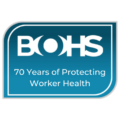Preventing ill-health at work a keyway for companies to promote their sustainability credentials and meet Sustainable Development Goals
The British Occupational Hygiene Society (BOHS), a leading scientific charity and the Chartered Society for Worker Health Protection has released a handy outline of how companies and organisations can link their worker health protection standards directly to sustainable development goals.
The 17 United Nations Sustainable Development Goals have become the global benchmarks which many of the worlds most influential organisations see as the objectives that we need to realise to have a sustainable future. Many companies worldwide have signed up to the United Nations Global Compact, while many more see Environmental, Social and Governance (ESG) as critical success factors, reportable to Boards. SMEs, who have championed sustainability have also pushed the boundaries. A “healthy working environment” was recently added to the list of global fundamental rights for people who work by the International Labour Organisation.
BOHS has published a simple guidance for companies and organisations to be able to track their initiatives in protecting workplace health directly to the 17 goals. It is working closely with the British Standards Institute and the Council for Work and Health to develop this further to help workplaces celebrate and promote health at work as a crucial lever of sustainability.
“Sustainability is about the environment, nature and the planet – but it is also about people,” says Professor Kevin Bampton who is the Society’s CEO and former United Nations Special Adviser. “We all understand that a throwaway approach to packaging and consumer goods is more than waste, but detrimental to our future. Yet we have a disposable approach to workers. We let people get ill unnecessarily, adding to health and social care costs, the benefits bill and hospital waiting lists. We still have a notion that in work there are “occupational hazards” and accept that thousands of people are allowed to get ill in the one environment wholly created and managed by humans – the working environment.”
BOHS which celebrates 70 years of scientific leadership and innovation for better workplace health in 2023 sees now as the opportunity to really make a difference.
“There are a multitude of illnesses, including incurable cancers that arise from workplace exposures,” says BOHS President, Chris Keen, who is Principal Scientist at HSE. “But the vast majority of these are relatively easy to prevent and avoid. At a time where it’s getting harder to find the right workers, it makes perfect sense for business sustainability to focus on the health of their workers, in the same way as they would want to look after any other key asset. This guide helps organisational leadership place worker health within their general sustainability strategy.”
BOHS provides a number of other free tools to help employers protect their workers, including their Breathe Freely Campaign Breathe Freely – Controlling exposures to prevent occupational lung disease in industry, which now has global reach and the HI management standard, which assists with Health Risk Management The HI Standard – Health in Industry Management Standard – Breathe Freely.
The BOHS guide to Workplace Health and the UN Sustainable Development Goals is available here for free download and use.
Health and Safety Executive figures show that in the UK, a staggering 1.2 million people suffer from occupational disease, compared to a working population of 32 million. Most of these diseases, ranging from cancer to COPD, are entirely preventable and are often caused by pollutants in the workplace that may go on to harm the environment.
In their evidence to the Select Committee, the charity states, “Aside from the human tragedy of waste, pain and loss, the economic implications are startling. There is no clear way of determining how many of the 800,000 plus recipients of funded adult social care require it because of occupational health exposures. Nor is it clear how many people become disabled as a result of past exposures to workplace hazards. However, it is a reasonable inference that there is a direct causal relationship between the number of people suffering from preventable occupational diseases, unemployment, disability, social care and demand for specialist health services.”
This year sees 50 years since the Robens Report started a new era in the protection of health and safety in the UK. However, while safety has improved significantly, the health burden caused by workplaces has remained stubbornly great. The HSE statistics also highlight that for every one person who dies as a result of workplace accident, almost 100 die from occupational disease.
The Society has estimated that prevention of diseases such as COPD in the workplace through simple means such as design, water-based dust suppression and using vacuum cleaners instead of brooms to clear up construction dust could save enough money to reverse the National Insurance rise.
“The direct cost of health and social care is aggravated by direct disability benefits costs, indirect costs to carers, lost taxation revenue and the loss of skills and talent. It is an unsustainable view of humans as a disposable resource. From cancer to COPD, asthma to reprotoxicity, current UK workplace policy is disabling people from work and creating a legacy of cost at a time we can least afford it.”
The Society is calling for the notion of an “occupational hazard” to be banished from workplaces. “What it masks is how deeply appalling the concept is: the notion that part of accepting a job is the acceptance of harm to health, scarcely belongs in modern society. The workplace is the one environment which is entirely human-created and where health exposures are entirely determined by humans.”
“We now have a health and social care system that can sustain life, but a national occupational health and hygiene strategy that does almost nothing to engender quality of life. Extending an individual’s working life by rehabilitating them back into unhealthy working environments will simply ensure that they are more broken, more in need and more used up than they would have been before. It simply defers the crisis in social care and health.”






